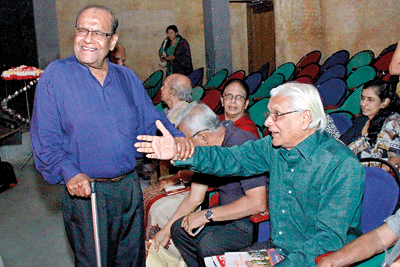Evoking empathy through his writings

At the launch: Namel Weeramuni (left) with old friend Prof. J.B. Disanayaka. Pic by Indika Handuwala
On August 26, well known director, dramatist, playwright and author Namel Weeramuni, launched “Nambukara Ganikawa” (The Respectful Prostitute) and a collection of riveting short stories titled “Atharamaga” at his Punchi Theatre in Borella.
“Nambukara Ganikawa” a Sinhala translation of the 1946 French play by Jean-Paul Sartre “The Respectful Prostitute” was undertaken by Namel in his time as a lecturer at the Kelaniya University in 2002. Approached by an eager student who pleaded with him to translate Jean-Paul’s classic play for her final year thesis, Namel who was pressed for time, recalls translating the play literally in mid air – as he was on-board flights to America and London to visit his children.
The translation went on to score big at many award festivals, winning “The Best Translation award” at the annual Drama Festivals, he recalls. So what drove the unassuming Namel to publish it? Namel whose love for a challenge is ever present even at his early 80s was captured by the honesty and vulnerability of the story – exposing the myriad of dimensions of the working class woman and her commonly perceived unsavoury profession.
“People come in search of her whereas with other prostitutes – it’s always an invitation,” he states. The respectability and dignity of the protagonist in the play is seen in her ability to be professional in her normally perceived ‘black market’ career. Readers are exposed to varying perceptions as it dawns on them that it matters not what job you do but how you view it.
Namel’s short stories hold a sentimental place in his heart. The nine stories in “Atharamaga” depict “the seriousness of our cultural background,” he shares. The dynamism of urban and middle class societies is scrutinized in these stories.
The avid director, dramatist, playwright and author started writing at his alma mater Nalanda College. Placing no importance on status or materialism associated with his achievements, instead valuing his relationships with his friends, family and experiences, Namel nostalgically recalls his abundance of “good times” many of which are captured in ink for others to similarly enjoy.
“Atharamaga” has nine short stories – fictional re-enactments of Namel’s experiences and observations. “My stories will feature various perspectives some in first person,” Namel comments, allowing his readers to experience genuine empathy towards his characters and their situations and observe the character of village folk. “In my opinon, a writer’s function is to write on humanity,” he pauses to add “and to create literature that can evoke a universal sense of empathy for situations and characters”.
Many of Namel’s best work is straight out of his own life. The author laughs as he remembers how he used to stay up until one to two a.m. writing. His cousin, comrade and former house guest who used to live with Namel during his University breaks Ahungalla Arunathilake used to tease Namel by aptly titling him “Short Story Factory”.
Born in Ahungalle, Namel spent 11 years of his childhood in the village and describes his childhood experiences as “A pond of memories” – one which we presume he dips into when in need of inspiration.
Namel who lost his father when he was a child, treasures each memory that he has captured over the years.
A family man Namel praises his “gem of a wife” who inspires him by “creating novelty of any situation”. He has a smile in his voice as he talks about his wife’s dexterity and meticulousness confessing that she keeps him grounded and energized throughout their years of marriage.
Namel who has spent a lifetime devoted to the development of the arts and culture of Sri Lanka, has published 10 books to date. This year’s edition will mark the 3rd edition of “Atharamaga”. Eventually, he hopes to release his memoirs.


